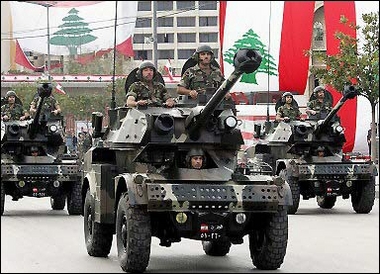 DUBAI, 23 January (IRIN) – Political observers often cite Lebanon as an example of freedom and democracy amidst other non-democratic states in the region. They point to the country’s relatively free press, and the fact that no major political parties have been banned. Consequently, Lebanon’s political landscape has not been dominated by one family or party, but by a variety of faces and parties.
DUBAI, 23 January (IRIN) – Political observers often cite Lebanon as an example of freedom and democracy amidst other non-democratic states in the region. They point to the country’s relatively free press, and the fact that no major political parties have been banned. Consequently, Lebanon’s political landscape has not been dominated by one family or party, but by a variety of faces and parties.
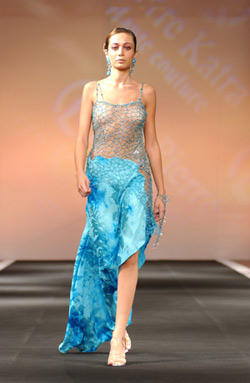 Pierre and Hadi Katra announce their first appearance in the United States and New York (NY) Fashion Week this February 3rd-4th at Grand Hyatt. After long negotiations with International Fashion Shows Headquarters in Switzerland, the Katras have agreed to present an exclusive collection for the organization’s special fundraiser gala."We have personally met with Sianetta Sunnasee of International Fashion Shows, and we find her intent to be sincere and true," says Pierre Katra. "Our group is designing an exclusive collection, specifically for the New York Fashion Week event.
Pierre and Hadi Katra announce their first appearance in the United States and New York (NY) Fashion Week this February 3rd-4th at Grand Hyatt. After long negotiations with International Fashion Shows Headquarters in Switzerland, the Katras have agreed to present an exclusive collection for the organization’s special fundraiser gala."We have personally met with Sianetta Sunnasee of International Fashion Shows, and we find her intent to be sincere and true," says Pierre Katra. "Our group is designing an exclusive collection, specifically for the New York Fashion Week event.
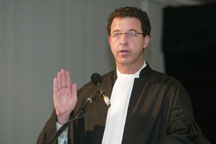 DAMASCUS/BEIRUT, 19 Jan 2006 (IRIN) – With the imminent arrival of Serge Brammertz, the United Nation
DAMASCUS/BEIRUT, 19 Jan 2006 (IRIN) – With the imminent arrival of Serge Brammertz, the United Nation
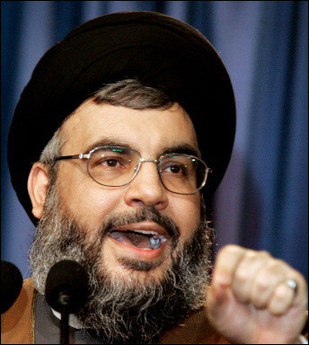 BEIRUT (Reuters) – The head of Lebanon’s Hizbollah guerrilla group has called on Saudi Arabia and Egypt to intervene to resolve a crisis brewing in Lebanon. In an interview published on Wednesday in the pan-Arab al-Hayat newspaper, Sayyed Hassan Nasrallah appeared to back Saudi mediation to ease tensions between Lebanon and Syria, and called for efforts to resolve rifts among Lebanese leaders.
BEIRUT (Reuters) – The head of Lebanon’s Hizbollah guerrilla group has called on Saudi Arabia and Egypt to intervene to resolve a crisis brewing in Lebanon. In an interview published on Wednesday in the pan-Arab al-Hayat newspaper, Sayyed Hassan Nasrallah appeared to back Saudi mediation to ease tensions between Lebanon and Syria, and called for efforts to resolve rifts among Lebanese leaders.
"Intervention is a must and there can’t be any Arab delay to do what is necessary," Nasrallah said. "The situation in Lebanon is bad and it has dangerous repercussions." Lebanon has been gripped by a political crisis since pro-Syrian Shi’ite ministers boycotted the cabinet five weeks ago, paralyzing a government dominated by anti-Syrian officials of a Sunni-led parliamentary majority coalition.Saudi Foreign Minister Prince Saud al-Faisal has said that Saudi Arabia has presented Lebanon and Syria with a plan to defuse tensions between the two countries.
.
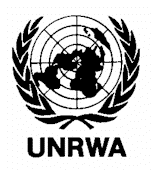 BEIRUT, 18 January (IRIN) – The UN Relief Works Agency for Palestine Refugees (UNRWA) refuted accusations that it had reduced the quality of medical care for Palestinian refugees in Lebanon, following reports of deteriorating health services. "UNRWA has reduced neither the quantity nor the quality of medical care," said Hoda al-Turk, assistant public information officer at UNRWA. "On the contrary, it has signed an agreement with a hospital that offers first class medical care at a very reasonable cost."
BEIRUT, 18 January (IRIN) – The UN Relief Works Agency for Palestine Refugees (UNRWA) refuted accusations that it had reduced the quality of medical care for Palestinian refugees in Lebanon, following reports of deteriorating health services. "UNRWA has reduced neither the quantity nor the quality of medical care," said Hoda al-Turk, assistant public information officer at UNRWA. "On the contrary, it has signed an agreement with a hospital that offers first class medical care at a very reasonable cost."
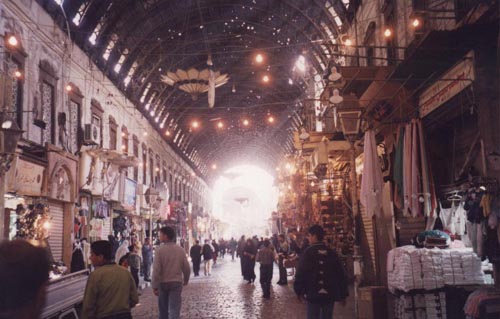 By Rasha Elass, DAMASCUS (Reuters) – For generations, Lebanese shoppers have journeyed to neighboring Syria to stock their larders and buy clothes and even furniture at bargain prices.But many have stayed at home since the assassination of Lebanon’s former Prime Minister Rafik al-Hariri last February put a chill on once-cosy relations between the two countries."I used to buy everything from Syria. My wife and daughters would head up there every couple of weeks to buy food, clothes, washing powder because it is less than half the price," said Hassan, a Lebanese driver with seven children living at home.
By Rasha Elass, DAMASCUS (Reuters) – For generations, Lebanese shoppers have journeyed to neighboring Syria to stock their larders and buy clothes and even furniture at bargain prices.But many have stayed at home since the assassination of Lebanon’s former Prime Minister Rafik al-Hariri last February put a chill on once-cosy relations between the two countries."I used to buy everything from Syria. My wife and daughters would head up there every couple of weeks to buy food, clothes, washing powder because it is less than half the price," said Hassan, a Lebanese driver with seven children living at home.
"We haven’t been since Hariri’s death because we heard that they have been insulting and humiliating the Lebanese. I am too scared to let my family go but it is really costing us. We cannot afford to have all the stuff we have been used to." With tensions between Syria and Lebanon at an all-time high, especially since a United Nations inquiry implicated top Syrian officials in Hariri’s murder, Syrian merchants are suffering.
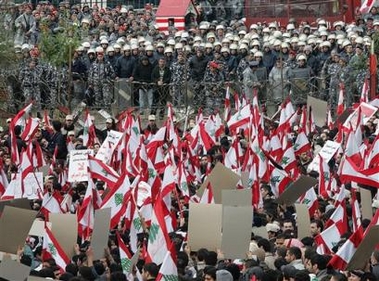 BEIRUT, Jan 17 (Reuters) – About 10,000 Lebanese students, chanting "America out", marched to the U.S. embassy near Beirut on Tuesday to protest against Washington’s policy in Lebanon. The protest, called by pro-Syrian parties including Shi’ite Muslim Hizbollah, came three days after clashes between police and a much smaller anti-U.S. demonstration in downtown Beirut.
BEIRUT, Jan 17 (Reuters) – About 10,000 Lebanese students, chanting "America out", marched to the U.S. embassy near Beirut on Tuesday to protest against Washington’s policy in Lebanon. The protest, called by pro-Syrian parties including Shi’ite Muslim Hizbollah, came three days after clashes between police and a much smaller anti-U.S. demonstration in downtown Beirut.
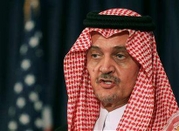 LONDON (Reuters) – Saudi Arabia has presented Lebanon and Syria with a plan to defuse tensions between the two countries over the killing of ex-Lebanese premier Rafik al-Hariri, the Financial Times reported on Tuesday. Saudi Foreign Minister Prince Saud al-Faisal told the FT in an interview that the kingdom had made proposals for an agreement, but was waiting for a response from Beirut and Damascus, and details would have to be worked out.
LONDON (Reuters) – Saudi Arabia has presented Lebanon and Syria with a plan to defuse tensions between the two countries over the killing of ex-Lebanese premier Rafik al-Hariri, the Financial Times reported on Tuesday. Saudi Foreign Minister Prince Saud al-Faisal told the FT in an interview that the kingdom had made proposals for an agreement, but was waiting for a response from Beirut and Damascus, and details would have to be worked out.
"Now it’s in the hands of both countries and they will let us know," he said.Russian Foreign Minister Sergei Lavrov urged caution in dealing with the standoff between Syria and the international community. "When investigating the circumstances of the crime, it is extremely important to stay within the legal framework and not to try, as with the Iranian nuclear program, to use this problem as an instrument for achieving political goals," Interfax quoted Lavrov as telling a news conference. Prince Saud insisted the kingdom was not seeking a compromise on the United nations probe into last February’s killing of Hariri which has implicated top Syrian officials in the assassination.
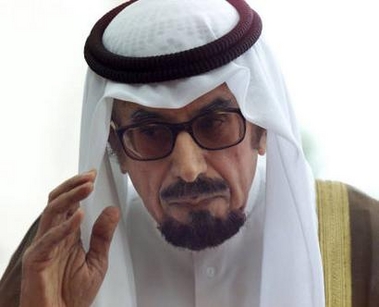 WITH MDA-LEBANON-KUWAIT-AMIR) KUWAIT, Jan 16 (KUNA) — The Ruling Al-Sabah Family received on Monday Lebanese President Emile Lahoud and an accompanying delegation of officials who expressed condolences on demise of the late Amir, HH Sheikh Jaber Al-Ahmad Al-Jaber Al-Sabah.
WITH MDA-LEBANON-KUWAIT-AMIR) KUWAIT, Jan 16 (KUNA) — The Ruling Al-Sabah Family received on Monday Lebanese President Emile Lahoud and an accompanying delegation of officials who expressed condolences on demise of the late Amir, HH Sheikh Jaber Al-Ahmad Al-Jaber Al-Sabah.
Lahoud and the other Lebanese officials were received upon arrival at the airport, earlier today, by Deputy Prime Minister, Minister of State for Cabinet Affairs and Minister of State for National Assembly Affairs, Mohammed Daifallah Sharar, ministers and the Lebanese ambassador to the State of Kuwait.
In Beirut, Lebanese Parliament Speaker Nabih Berri, in a message addressed to the top Kuwaiti leaders, praised the late Amir, namely the aid granted during his era for infrastructural projects in the country, namely in southern Lebanon where Kuwait financed the reconstruction of villages, destroyed in Israeli attacks.
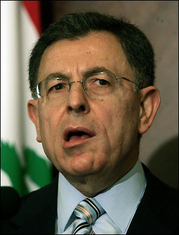 BEIRUT, Lebanon, Jan. 16 (UPI) — Prime Minister Fouad Siniora has said Lebanon won’t ever sign a peace agreement with Israel. Siniora was quoted Monday as saying in the Beirut daily As-Safir he "truly hopes to die before being obliged to sign one day a peace treaty with Israel." He stressed "Lebanon will not sign any peace agreement with Israel even after the liberation of the Shabaa Farms from Israeli occupation and the release of our prisoners in Israel." Lebanon and Syria say the famrs belong to Lebanon, but Israel and the United Nations say they belong to Syria.
BEIRUT, Lebanon, Jan. 16 (UPI) — Prime Minister Fouad Siniora has said Lebanon won’t ever sign a peace agreement with Israel. Siniora was quoted Monday as saying in the Beirut daily As-Safir he "truly hopes to die before being obliged to sign one day a peace treaty with Israel." He stressed "Lebanon will not sign any peace agreement with Israel even after the liberation of the Shabaa Farms from Israeli occupation and the release of our prisoners in Israel." Lebanon and Syria say the famrs belong to Lebanon, but Israel and the United Nations say they belong to Syria.
Siniora said, "Lebanon has a truce agreement with Israel which we will revive until a just peace process in the region materializes under which the Golan Heights are returned to Syria and a Palestinian state is set up on Palestinian territory." Siniora criticized local and regional parties for doubting Lebanon’s commitment to Arab causes. "No one has the right to doubt Lebanon because it is the only state which fought and is still fighting Israel for more than 35 years during which the Lebanese people suffered more than any other Arab country could bear," Siniora said.



